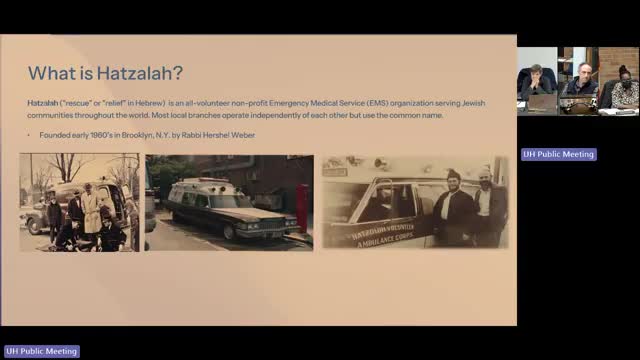Hatzalah Cleveland presents volunteer, culturally sensitive EMS model and seeks coordination with University Heights services
Get AI-powered insights, summaries, and transcripts
Subscribe
Summary
Hatzalah Cleveland told City Council that its volunteer, community-based EMS provides rapid culturally sensitive non-transport care in and around University Heights, averaging a 90-second response from dispatch, and described training, dispatch procedures and plans for interoperability with municipal services.
Hatzalah Cleveland presented an overview of its volunteer emergency medical service to the University Heights safety committee, emphasizing rapid response, cultural sensitivity and local coordination with municipal emergency services.
Lenny Roa, director of Hatzalah Cleveland, said the nonprofit affiliate — rooted in a model founded in Williamsburg, New York — operates as an all-volunteer 501(c)(3) that provides free, culturally sensitive emergency care and community education. "Hatzalah isn't just an EMS agency that happens to be Jewish. It's an organization built around the values, traditions, and sensitivities of the communities it serves," Roa said.
Roa described Hatzalah Cleveland's local footprint since January 2025 as covering portions of Beechwood, Cleveland Heights, University Heights, Lyndhurst, Shaker Heights and South Euclid. He gave operational figures: 30 responders across four neighborhoods, 10 dispatchers with 20 more in training, and more than 300 calls in roughly 10 months of operation; the group also runs frequent mock-call scenarios and public-safety events. Roa said the organization averages about 90 seconds from dispatch to an initial volunteer response.
Roa explained Hatzalah’s two-dispatcher model: one dispatcher interviews the caller and populates the computer-aided dispatch (CAD) system while a second dispatcher simultaneously starts formal ALS notifications to 911 and alerts the nearest volunteer units. He said Hatzalah’s dispatchers can be located across the U.S. but that the CAD page and automatic routing aim to remove delay; volunteers receive a text with navigation links once a member is assigned.
Roa addressed cultural practices and operational limits: Hatzalah integrates Jewish law into its protocols while prioritizing life-saving care, and most frontline responders are male under rabbinical advisory guidance, although female responder teams such as Ezrat Noshim may respond specifically to women’s obstetric/gynaecological calls. Roa also described community services including a large safety fair (more than 700 attendees and roughly 200 people trained in CPR) and targeted prevention campaigns such as child back-seat sensor installations.
Council members asked whether Hatzalah activates 911 for calls; Roa said the group now activates 911 immediately for every call, which has reduced direct Hatzalah-only call volume. City fire leadership described an administrative effort to formalize cooperation: the city provided a memorandum of understanding template for ride-alongs and training, but the chief said the city had experienced delays in executing an engagement agreement with University Hospitals, which delayed student ride-along access for some cohorts.
The session was informational; committee members thanked Hatzalah for the presentation and asked staff to continue coordination. No policy votes were taken on Hatzalah operations during the meeting.
